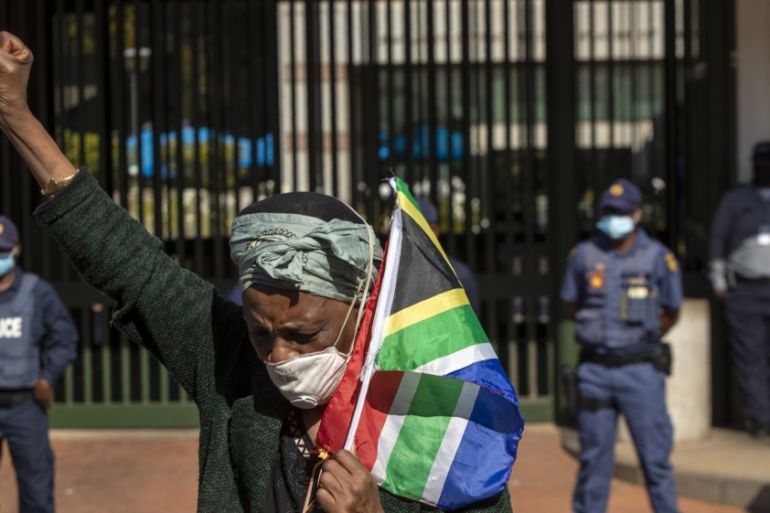Black Lives Matter and the trap of performative activism
The global Black Lives Matter movement can only succeed if it goes beyond moments of outrage and insists on real change.

Once again, we are grieving the senseless killing of an African American man at the hands of the state. Only this time, because the events causing his death were captured on video and broadcast on social media, George Floyd has ruptured the silence surrounding racism, not only in the United States, but also in parts of Africa, Europe and Asia.
There is a long history of Black people being killed at the hands of the state in every part of the world. But until recently, oceans and borders between us had prevented our interconnected struggles from meeting. Social media changed this. Even the often-passive African Union came out strongly against the killing of George Floyd, and issued a statement calling on the US “to intensify their efforts to ensure the total elimination of all forms of discrimination based on race or ethnic origin”.
Keep reading
list of 4 itemsBiden labels Japan and India ‘xenophobic’ along with China and Russia
After deadly attack, Russia’s Central Asian workers report rising racism
‘Feel less and less like playing’: Vinicius Jr in tears over racist abuse
This was an unusual turn of events, and perhaps a testament to the global impact of the Black Lives Matter movement. But could there be more to it?
Watching the global community stand up for the Black Lives Matter movement from South Africa, where in April, Collins Khoza was killed by security forces in front of his family and Robyn Montsumi was found hanging in a police cell, gives me a sense of dread and detachment.
The world did not stand up for Khoza and Montsumi. There was no palpable outrage for them. No government or international body issued a single statement demanding accountability for their deaths.
If the African Union – and the rest of the global community – is only grieving with America, who is grieving with us?
The power of social media as an outlet to organise and build transnational movements for social and political change is undeniable. However, there is still more work to do to build real, effective transnational solidarity.
We rushed to globalise the Black Lives Matter with what I can only describe as a lack of foresight to harness the momentum generated by the movement into legislative and permanent cultural change in our own countries. This could be a consequence of many around the world seeing support for Black Lives Matter as an act of charity or goodwill towards African Americans specifically, instead of an admission of a global cultural reality. The same military tanks that pose a threat to Black bodies in America, however, are policing protesters in Coyah, Guinea, as we speak.
Perhaps another obstacle to transnational solidarity is the fact that while the fusion of social media and social justice has become more prevalent, we still heavily rely on Western media to deem what issue, tragedy or calamity is worthy of social outrage.
Speaking at a youth symposium at Johns Hopkins University, activist DeRay Mckesson said, “People of colour are always facing issues of erasure, and erasure operates in two ways – the story is either never told, or it is told by everyone but us.” Too often, transnational efforts to affect change fail because stories outside the US are rarely told on a global scale.
Another dilemma presents itself in the form of corporations and brands co-opting the cause for profit. In an article for The Conversation, Bree Hurst, insists that by expressing their support for the Black Lives Matter movement or similar sentiments, brands like Nike and Netflix are somehow showing leadership, writing, “It’s easy to dismiss these statements as low-cost tokenism or politically correct wokism” when in fact, brands are taking up “political corporate social responsibility”.
This cannot be true. In fact, the easy thing to do here is to praise white-owned establishments for acknowledging that indeed Black lives matter and throwing chump change to Black organisations. What they do is less about dismantling systemic racism and more of a ploy to appease a quick-to-forget public; it is performative.
If we are moving towards change, reform and justice, white-owned establishments need to be held to a higher standard than posting on Instagram. Substantive change begins where decisions are made, in boardrooms, where often the only thing of colour is a pen.
A global movement for social justice can only succeed if it goes beyond moments when white supremacy uncovers itself in the form of state-sponsored brutality on Black bodies in the US, and gets transported to our computer screens through social media.
We need to demand the same response from governments, corporations and international bodies when queer Black women are murdered in Brazil, like Marielle Franco, when sex workers die in police custody in South Africa, like Robyn Montsumi, and when Black trans people are killed in the US, like Kiki Fantroy.
The only alternative to a lack of global substantive change, is the continuous treatment of systemic racism as isolated events that “sometimes” happen in the US. If we do not truly coordinate, we will be back here again, with another global outcry and our protests of solidarity will be rendered meaningless over time.
The views expressed in this article are the author’s own and do not necessarily reflect Al Jazeera’s editorial stance.
